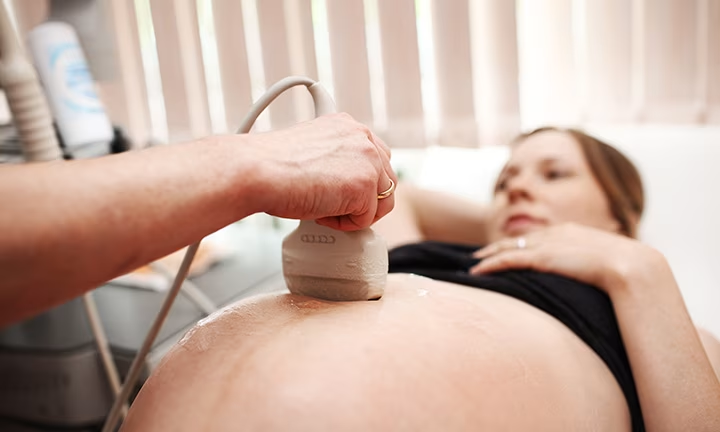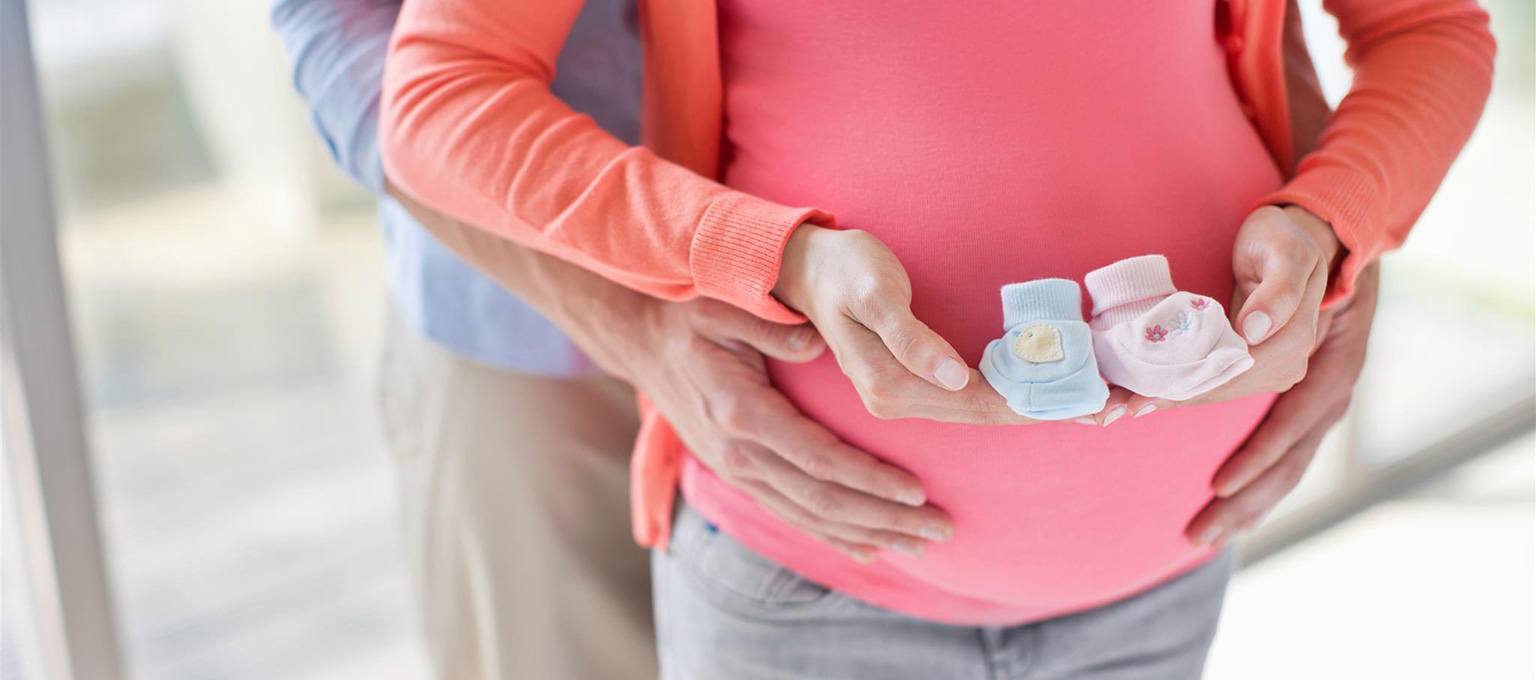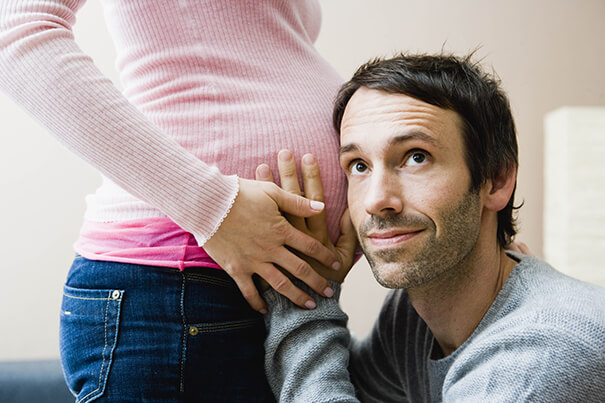
Twin Pregnancy Week by Week
So, you’ve hit the jackpot—you’re pregnant with twins! While you’re adjusting to this life-changing news, your little ones are already growing and preparing to meet you! As you embark on this double adventure, it can be helpful to know about some of the common twin pregnancy symptoms that may await you week by week.
Twin Pregnancy: First Trimester
In the first few weeks of your twin pregnancy, you might notice some typical signs of early pregnancy, such as breast tenderness, fatigue, nausea, and a missed period. During your first trimester, a home pregnancy test can confirm your hunch that you're pregnant, and eventually an ultrasound scan at your healthcare provider's office will reveal you are pregnant with twins. Although the first few weeks are a little uneventful, the first few months are quite exciting! Both of your babies develop from a cluster of cells to a tiny fetus with a heart, spinal cord, head, and limbs. Read on to learn about twin pregnancy development and symptoms, week by week during the first trimester.
3 Weeks
After the first three weeks of pregnancy, you may start to feel a few pregnancy symptoms. And when it comes to a twin pregnancy, there’s quite a lot going on in that belly of yours, which is now nurturing either identical or fraternal twins.
In Summary
The first few weeks of your twin pregnancy may seem uneventful, but they’re quite important because they’ll determine if you’re having fraternal or identical twins. Fraternal twins come from two separate zygotes (fertilized eggs), whereas identical twins come from one zygote. It’s likely that you won’t know you’re pregnant with twins until you have your first ultrasound.
4 Weeks
At around 4 weeks pregnant, some important developments occur, including implantation. This is when you may notice one of the first symptoms of pregnancy, which is implantation bleeding.
5 to 8 Weeks
When tracking pregnancy symptoms week by week, whether with one baby or twins, 5 to 8 weeks pregnant is when nausea and vomiting—aka morning sickness—might kick in. Though the precise cause or causes of this condition are unknown, the pregnancy hormone human chorionic gonadotropin (hCG) may be a contributing factor. No one loves having this unpleasant symptom, which can be (but isn’t always) more severe during a twin pregnancy, but many moms-to-be choose to think of it as a sign that their pregnancy is going well! This is important considering all the growth and development your babies are experiencing during this time:
9 to 13 Weeks
As you enter the final weeks of the first trimester, you may be surprised to learn what’s happening in that baby bump of yours.
In Summary
As you make your way through your first trimester week by week, you’ll probably experience some common pregnancy symptoms as your twins develop, including implantation bleeding, a missed period, nausea, fatigue, and breast tenderness. Your babies are hard at work forming limbs; developing faces; sprouting fingers and toes; forming brains, spinal cords, and other organs; and more!
Your Twin Pregnancy in the Second Trimester
Twin pregnancy symptoms, when tracked week by week, aren’t too different from those in a singleton pregnancy. However, twin moms-to-be usually show their bumps sooner, and during the second trimester, it will become increasingly obvious that you’re pregnant with twins. You might also feel more uncomfortable and tired than singleton moms during this time or gain more weight, which is completely normal—after all, your body is a nourishing home to two developing babies! Read on to learn about twin pregnancy development and symptoms, week by week during the second trimester.
14 to 17 Weeks
The beginning of your second trimester is a busy time for your babies. They’re gaining weight and becoming more active. As for you, you’re entering what’s known as the golden period of pregnancy, when morning sickness and fatigue finally start to subside, and you feel more energized.
In Summary
Morning sickness and fatigue may start to subside at the beginning of your second trimester. Inside your belly, your babies’ bones are starting to harden, and your little ones are beginning to move their arms and legs.
18 to 22 Weeks
A few new aches and pains could crop up at this time, thanks to your growing uterus and hormonal changes. To help ease the discomfort, try adding some exercise to your daily routine, if your healthcare provider gives you the OK. Exercising while pregnant may not only minimize discomfort but also help boost your energy level and increase blood circulation, which benefits your twins.
23 to 27 Weeks
You may start to develop some new symptoms as your twin pregnancy progresses week by week in the second trimester. For example, it’s possible to feel Braxton Hicks contractions, a sign that your body is practicing for labor. These practice contractions are also known as false labor, as they’re not the real deal. Your babies are also making progress and getting ready for their big entrance.
In Summary
Morning sickness and fatigue may start to subside at the beginning of your second trimester. Inside your belly, your babies’ bones are starting to harden, and your little ones are beginning to move their arms and legs.
Your Twin Pregnancy in the Third Trimester
In the third trimester, some of the most common twin or singleton pregnancy symptoms that could appear week by week include backaches as well as swelling in your hands, feet, and legs. As a result, you might find it hard to sleep or walk comfortably. Meanwhile, your twins are getting ready for the big day! During this time, they’re listening to familiar sounds, such as your voice, and are likely settling into the optimal position for a vaginal delivery, which means both babies have their head down. In some cases, only one twin may be facing headfirst, or both twins are facing feet first. Check the visual below to get an idea of how your babies might settle in the womb. And keep in mind that with twin pregnancies, there’s a higher likelihood of needing a cesarean delivery or giving birth prematurely.

Although you might have checked our due date calculator, be aware that in an average twin pregnancy, twins are born closer to 35 weeks than to 40 weeks, so it’s worth getting prepared early. Make sure you have doubles of all the clothes, cribs, wipes, and diapers you’ll need! And since double the fun means double the price, earn Pampers Cash and save hundreds by downloading the Pampers Rewards App.
In Summary
The third trimester of pregnancy goes by quickly, as twins are usually born earlier, often at around 35 weeks. It’s also more common to have a cesarean section when pregnant with twins. You can start to prepare for your babies’ arrival a little early, so that you’re ready to welcome them into their new home!
Read on to learn about twin pregnancy development and symptoms, week by week during the third trimester.
28 to 32 Weeks
At this stage, your body is making more blood than it usually does, and your heart is pumping quickly to circulate it throughout your body. And, naturally, your baby bump continues to expand week by week, as your twins grow and develop.
33 to 36 Weeks
As mentioned above, those who are pregnant with twins can expect an earlier delivery. So, at this point in your twin pregnancy, you’re in the home stretch, and your babies know it!
In the video below, watch one of our partner nurses offer advice on when to head to the hospital as the signs of labor begin.
In Summary
The third trimester of pregnancy goes by quickly, as twins are usually born earlier, often at around 35 weeks. It’s also more common to have a cesarean section when pregnant with twins. You can start to prepare for your babies’ arrival a little early, so that you’re ready to welcome them into their new home!
FREQUENTLY ASKED QUESTIONS
Your healthcare provider will be able to determine if you’re having twins at your first ultrasound, which often takes place at about 12 weeks.
The Bottom Line
Were you not expecting two for the price of one? After the initial surprise of a twin pregnancy, it’s completely natural to feel overjoyed, overwhelmed, or even shocked for a while! But, knowing the symptoms of a twin pregnancy and what awaits you week by week can help you feel confident along the way and offer some peace of mind. In some ways, a twin pregnancy isn’t that different than a singleton one. You’ll have a larger baby bump, of course, and you may feel more tired or experience other symptoms to a greater degree; but you’ll make similar progress as the weeks and months go by and your due date approaches. However, to summarize a few important differences, a twin pregnancy might include
Think of it this way: though a twin pregnancy comes with its share of challenges, having twins means there are two babies to love and bring joy into your life! Hang in there and enjoy the journey as much as possible. You’ll be amazed to discover how your heart will grow twice as much!
- Mayoclinic: Symptoms of pregnancy: What happens first
- Mayoclinic: Twin pregnancy: What twins or multiples mean for mom
- Mayoclinic: Fetal development: The 1st trimester
- Mayoclinic: Fetal development: The 2nd trimester
- Mayoclinic: Fetal development: The 3rd trimester
- Mayoclinic: Pregnancy and you blog, Swelling in pregnancy: Where did my ankles go?
- Mayoclinic: Fetal presentation before birth
- National Library of Medicine
- Mayo Pregnancy book
Read more about Pregnancy
Join a World of Support
through Pregnancy and Parenthood.
TRACK WITH TOOLS
LEARN WITH EXPERTS
GET REWARDED







